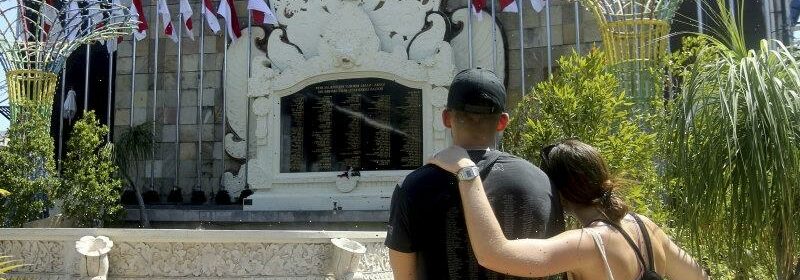Why we need to go back to Bali

Isaah Yeo, co-captain of the 2022 rugby league premiers the Penrith Panthers, has October 12, 2002 tattooed on his left arm. It is inked along with the name of his uncle Gerard, one of the six Coogee Dolphins rugby league team who died that day in the Bali bomb blasts that killed 202 people, 88 of them Australian.
The Dally M Captain of the Year, along with other male members of the Yeo family, including his father Justin, have body art honouring Gerard, who was 20 and on an end-of-season footy trip when he was killed in the Sari Club explosion.
The memorial to victims of the Bali bombings.Credit:AP
Twenty years on, many Australians also have an indelible yet invisible tattoo of the date of this tragedy marked on their hearts. Many of us will be returning to Bali this week in our minds, and at memorial services across the region, from Coogee to Kuta. I’m encouraging us all to go back to Bali in real life too, now that international travel is possible. Our nearest, largest neighbour needs us as it comes to terms with the toll taken by COVID-19.
I’m just back from Bali and can attest that, while the school holiday and post-footy season crowds are slowly starting to return to the isle of the Gods, businesses and people there are still hurting.
Many Australian tourists stayed away after the bombs. But that was nothing compared to the downturn in tourism in the past two years during COVID-19 lockdowns and bans on international travel.
Flowers in memory of those who died, at the Coogee Bali bombs memorial in 2021.Credit:Helen Pitt
Unlike Australians who received pandemic payments like JobKeeper or JobSeeker, support from the Indonesian government to its citizens was minimal. Many workers reliant on tourism returned to farm their rice fields or fished to feed their families.
One of the Balinese people I spoke to said he just got used to being hungry during the pandemic. They had no money for extra food, so grew or caught everything themselves. A wood carver from Mas, just out of Ubud, turned his hand to forging slingshots which he sold on YouTube to feed his family.
Some hotels and shops simply didn’t survive. You see evidence all over the island, with once prosperous hotels, shops and services boarded up, some burnt and many deserted.
In many people’s eyes, Kuta Beach and the strip of sandy beaches and cliffs along the west coast, from Uluwatu in the south to Cenggu in the north, may seem like Bogan central. Partying on a beach or in nightclub, riding a moped in a Bintang t-shirt or surfing is not everyone’s idea of a holiday.
But venture further inland, or into the hills around Ubud or less touristy islands further away, and you will find tropical paradises as verdant and inviting as Byron Bay or Port Douglas, with people in need of sustenance our Australian dollar can provide.
We owe it to our regional neighbours to help them recover. Sure, people in Australia suffered. Many died of COVID-19. But we are an advanced country and parts of Bali are definitely still developing. It is called a Third World paradise, but due to the loss of the lucrative tourism dollar that lustre is waning. And Hindu Bali is a different world from predominantly Islamic Java, where Umar Patek is jailed for 20 years over his role in the bombings, although his sentence was reduced in August.
There’s anger at Indonesian authorities about his potential early release. Not just in Australia but also in Bali. That he could be released soon troubles many, Balinese people told me.
Last year’s service in Coogee in memory of those who died in the Bali bombs, including members of the Coogee Dolphins football team.Credit:Helen Pitt
Last Monday I visited the memorial in honour of all the people who died in the bombings. The Sari Club is essentially a vacant parking lot; Paddy’s is pretty much still a sad burnt out shell.
Efforts to buy the land and turn the Sari Club site into a remembrance Peace Park have failed. Tragically, both the chairman of the Bali Peace Park, former Channel 10 journalist Nick Way, and the Vice President and Bali bomb survivor Gary Nash, both died last month.
So we need to find our own way to honour the dead, without a park.
Anniversaries are hard, but an unavoidable part of the grieving process for the families who lost loved ones.
Two decades on, as we remember all those who died and their loved ones, let’s also not forget the people of Bali. They are still hurting too.
Helen Pitt is a journalist at The Sydney Morning Herald.
The Opinion newsletter is a weekly wrap of views that will challenge, champion and inform your own. Sign up here.
Most Viewed in National
From our partners
Source: Read Full Article


